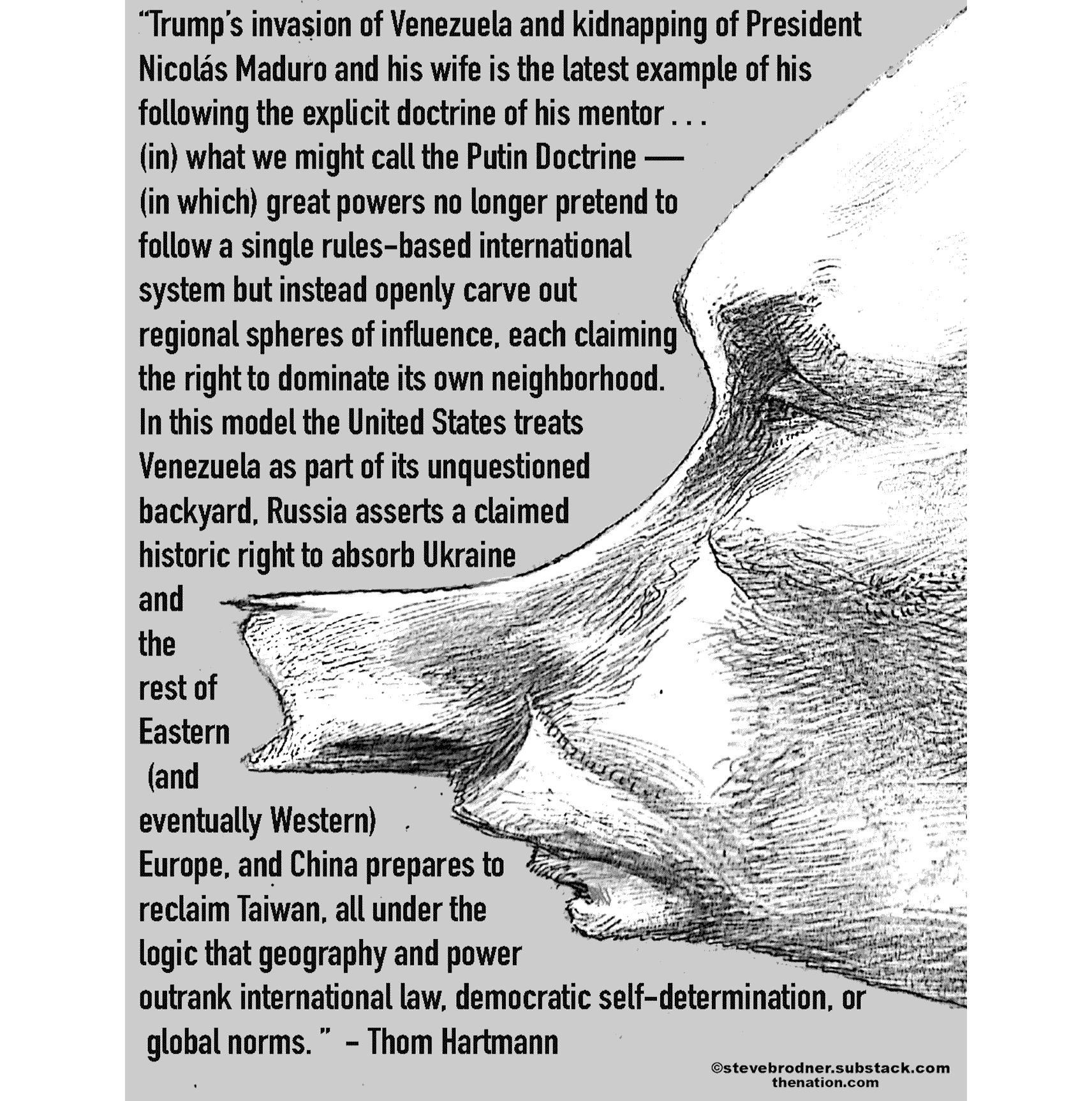Chicago’s Palestinians Won’t Let the DNC Ignore Gaza
The Chicago area is home to the biggest Palestinian diaspora in the US. They’re going to make sure the Democratic National Convention hears them.
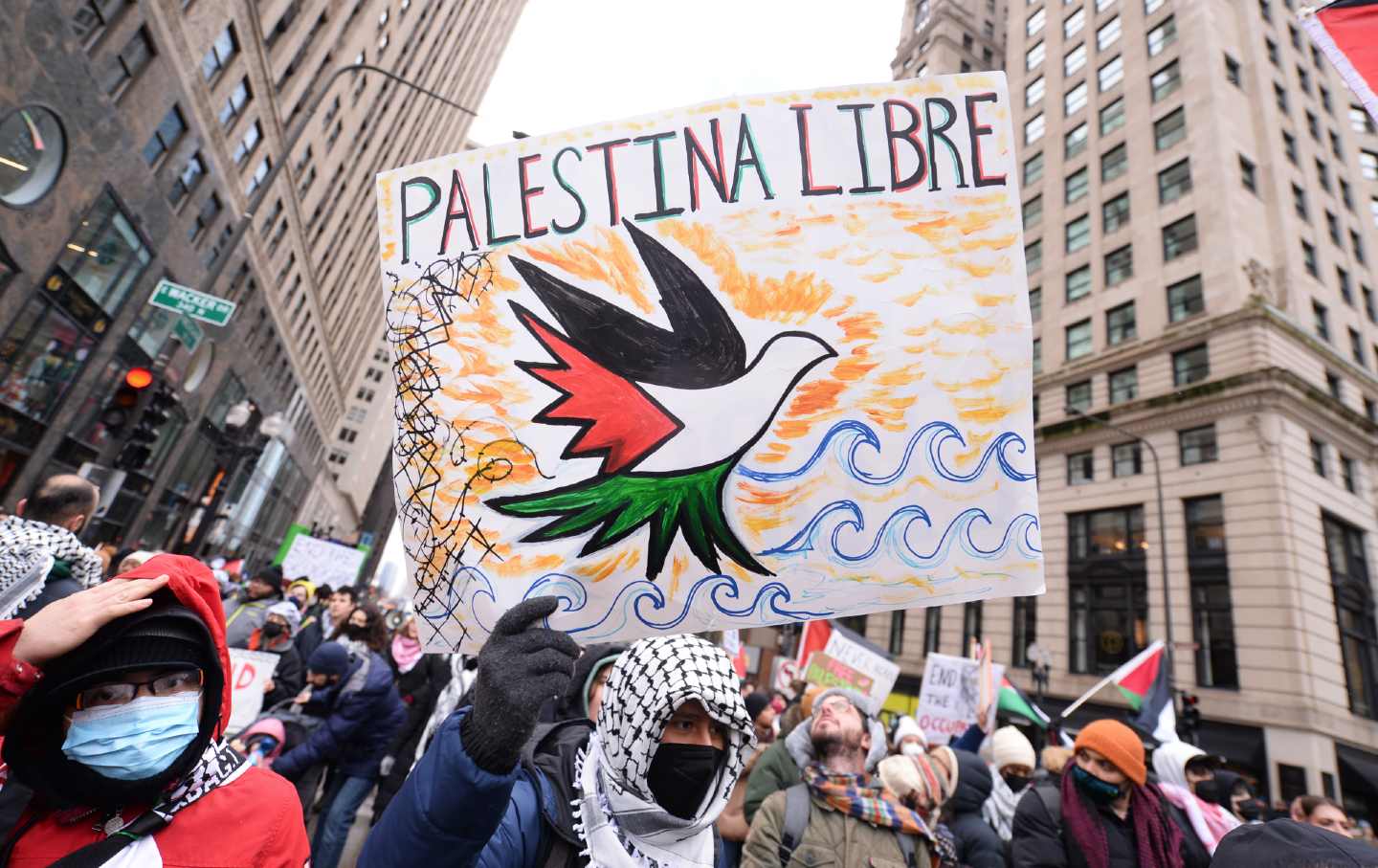
Pro-Palestinian demonstrators gather at the “End the Year with Ending Genocide” rally in Chicago on December 31, 2023.
(Jacek Boczarski / Anadolu via Getty Images)
Bridgeview, Illinois—Nesreen Hasan used to love going to stand-up comedy shows in Chicago. But for the past 10 months, since Israel started bombing and besieging the Gaza Strip, killing more than 14,000 children, she hasn’t been able to bring herself to participate in such organized fun. “I feel too guilty,” said Hasan, who is wearing a green shirt with a green keffiyeh draped over her shoulders. “This is not a time to be celebrating.”
Hasan is part of the Chicago metro area’s vast Palestinian American community, the largest in the country, and like her friends and family, she has been plunged into what she calls “continuous mourning.” She has one friend who lost 100 family members in Gaza. She knows students who can’t focus on their classes. Her cousin toned down his recent wedding celebration over concerns that jubilant festivities are inappropriate right now. Hasan lost dozens of distant relatives from her own family tree—she had never met them, but still, “it tears at you,” she said. “Every day is a funeral for us.”
It is not lost on Hasan—an organizer with the Palestinian Feminist Collective and the Chicago branch of the US Palestinian Community Network—that the Democratic Party that bears tremendous responsibility for this loss is throwing a giant party in her backyard. The Democratic National Convention (DNC) is slated to take place in Chicago from August 19 to 22. Vice President Kamala Harris is the party’s presumptive nominee to replace Joe Biden, and the event will be at least part pep rally.
But the convention will also be a site of political struggle. Hasan is part of an effort to ensure that when the DNC comes to town, it is met with giant protests. The Coalition to March on the DNC is composed of more than 150 groups, according to organizers, both from Chicago and across the United States, and will address a host of issues, from racial justice to LGBTQ rights to migrant justice to dignified jobs to opposition to police violence. But given that the US is backing Israel as it kills Palestinians in Gaza with an efficiency that is unprecedented in modern times, the Coalition to March on the DNC decided to make Gaza and Palestine the focus of the two major marches it is planning on August 19 and 22, in addition to an August 21 march organized Chicago’s Coalition for Justice in Palestine.
A Coalition to March on the DNC statement put the Gaza-related demands simply: “an end to the genocide and an end to US aid to Israel.” The coalition does not take a strategic position on how to approach the 2024 presidential election beyond these demands, which are unchanged with Biden stepping down, and it’s certainly not a pro-Republican body. Organizers are expecting tens of thousands to take part in the demonstrations, in a city that has been a US center of Palestinian diaspora organizing for decades.
“If this genocide is going to continue, we’re not forgetting about this,” Hasan said. “The longer it goes on, the more and more we feel betrayed.”
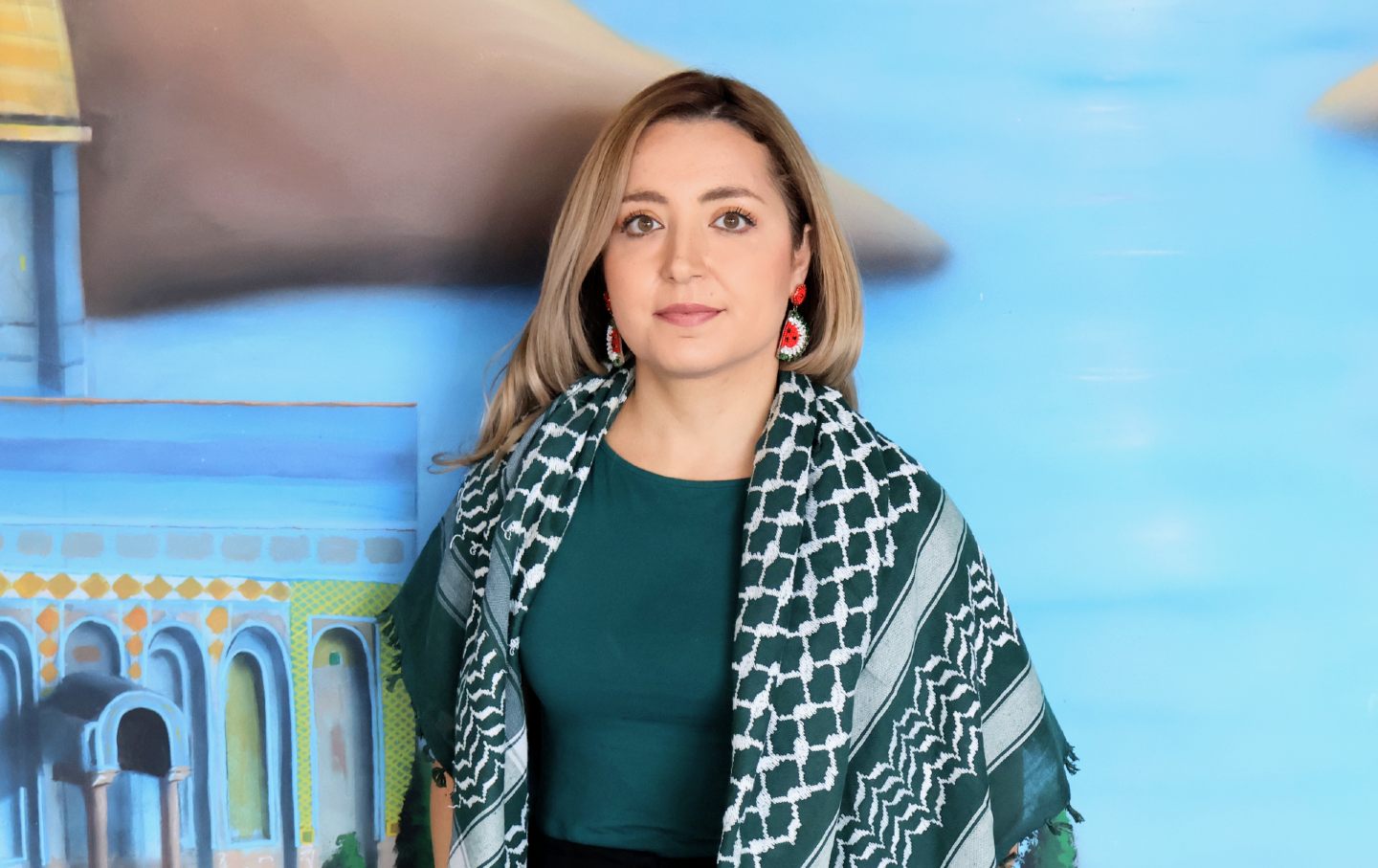
We were sitting in a Palestinian-owned café called The Qahwa, or “coffee” in Arabic, in the southwest suburb of Bridgeview, part of the Chicago metro area known as Little Palestine. Near the espresso machine, coffee beans were arranged on the counter to spell “Free Palestine” in Arabic. Among the art covering the walls was a colorful canvas, a collaboration by 20 different artists, with large black letters in the center that read “Hinds Meadow.” It was a reference to Hind Rajab, a 6-year-old whose pleas to the Palestinian Red Crescent for help from a car where she was surrounded by dead family members were recorded and heard across the globe. (Israeli forces killed her, along with the two paramedics who tried to rescue her.)
Hasan looks younger than her 36 years, but speaks with a confidence and political seriousness that mark her as an experienced organizer. As painful as this moment is, she said, it’s been heartening to see people “waking up.” Hasan explained, “I have a friend who was at the grocery store and wearing a keffiyeh. This older woman came up to her, and my friend thought she was going to be attacked, but then the woman said she supports the Palestinian people. She said she used to go to a Christian Zionist church, and she was sorry it took a genocide to wake her up.”
For the past 10 months, the Chicago area has been home to nonstop mass marches and direct actions: Protesters have blocked intersections, staged sit-ins in political offices, and protested lawmakers at their homes, with tremendous participation from Palestinian Americans and progressive Jews from groups like Jewish Voice for Peace and If Not Now. Student encampments at three different Chicagoland universities provided “a glimpse of the mobilizations and people power we could really garner in Chicago,” said Jenin Alharithi, 22, who participated in the University of Chicago encampment this spring in her then-role as vice president of Students for Justice in Palestine at the University of Illinois–Chicago, which did not have its own encampment.
Hasan said it was the experience of being rebuffed, ignored, and disrespected by elected officials that forced their Palestinian American constituents to escalate tactics. “I’ve watched people I know and care about, who lost over 100 members of their family in Gaza, whose family members were crushed to death, go to Tammy Duckworth, go to Dick Durbin, go to Washington, only to be attacked and dehumanized, with no empathy or sympathy for what they’ve been through,” she said.
“Our community knows not to go to the Republicans. We know where they stand. Democrats have this image that ‘we’re the moral party,’ supporting assault rifle bans. They’re known as the anti-violence party. But they are OK with our community being harmed.”
But the impetus for the marches goes back further. Hatem Abudayyeh, 53, a long-time Palestinian organizer in Chicago, wears many hats: He is one of the spokespeople for the Coalition to March on the DNC, a national chair for US Palestinian Community Network, and the executive director of the Arab American Action Network. Sitting on a park bench in the north Chicago suburb of Winnetka, he explained that USPCN joined the Coalition to March on the DNC the “minute” it was established, well before Israel’s current operations in Gaza. “We were in on the ground floor with the coalition, and then, when October came around, the coalition said, ‘We have to shift.’”
Since October, Israel has killed close to 40,000 people in Gaza, according to Gaza’s Health Ministry, though one estimate, from the British medical journal The Lancet, says the number could surpass 186,000 when considering those directly and indirectly killed. (The Hamas-led surprise attack on October 7 left 1,195 Israelis and foreign nationals dead.) Around 10 percent of Gaza’s population has been killed, wounded, or is missing, according to Euro-Med Monitor. Scholars and experts say that Israel’s ongoing actions in Gaza are genocidal, and the International Court of Justice found in January that it is “plausible” that Israel is committing genocide.
Now, Abudayyeh said, “the DNC is going to be a different animal. I truly think if Gaza hadn’t happened, the Republican National Convention would have been where we put most of our resources.” (Members of the coalition did protest the RNC in Milwaukee, which was replete with bloodthirsty anti-Palestinian rhetoric, as well as former president Donald Trump’s recent appearance in Chicago.)
But Abudayyeh, who is wearing a blue polo shirt and speaks in a manner that is both affable and weighty, underscored that “there are those of us who say, ‘Hey, listen, it’s more than just that Israel has killed 40,000 people. It is the essence of the state, the settler colonialism, and apartheid.’ What we’re saying is different from ‘stop the killing and then go back to the status quo.’ We have the material demand around no aid, and we are saying stand with Palestine. Period.”
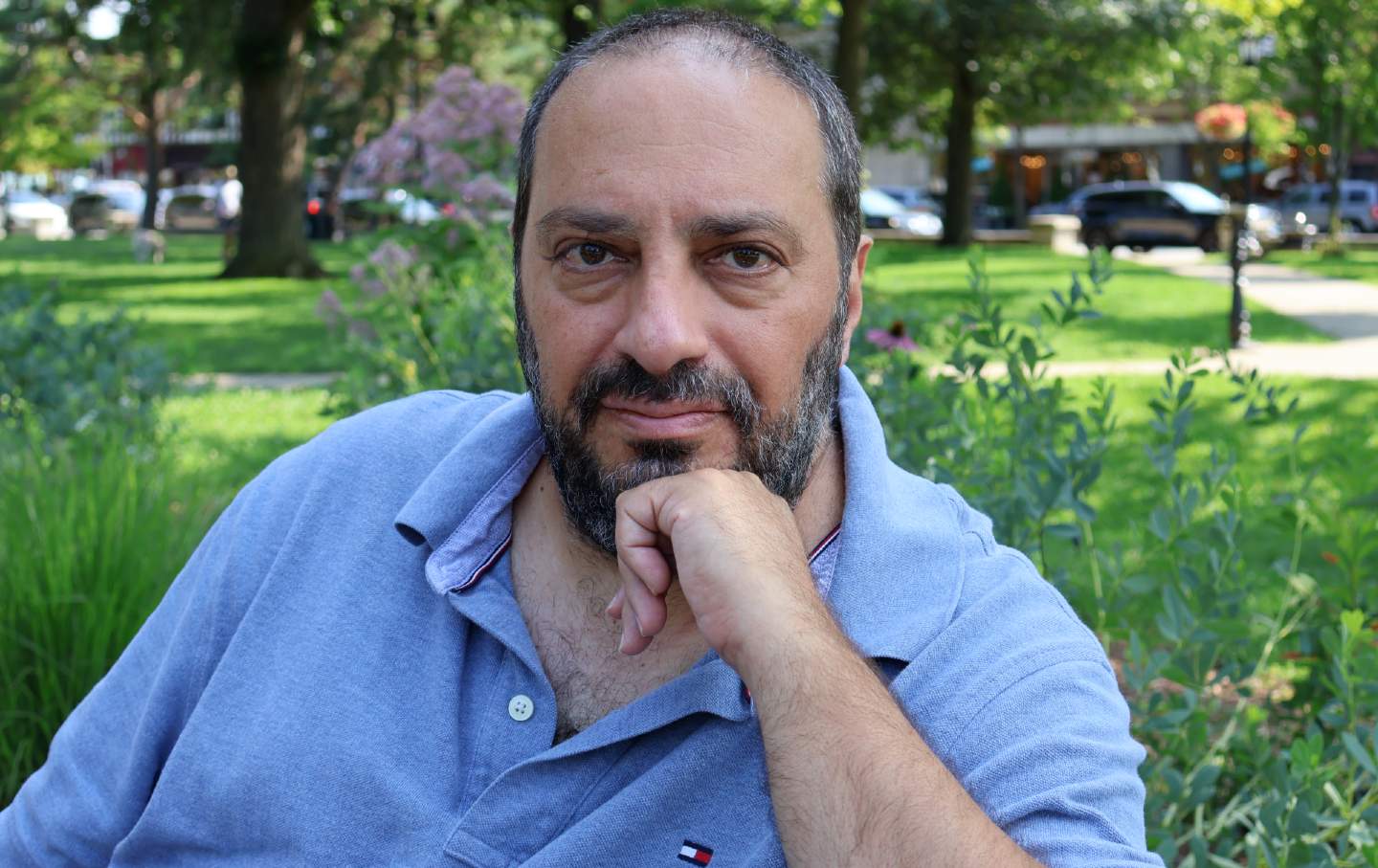
The Biden administration has provided arms and essential munitions—on top of an ongoing hefty aid package—for Israel as it has bombed and invaded Gaza. Republicans, too, are fierce supporters of Israel, often employing virulent rhetoric to debase Palestinians, and Trump, during his presidency, took the inflammatory step of recognizing Jerusalem as the capital of Israel (a position Biden supported as a candidate for the White House). But support for Israel is an area of broad and long-standing bipartisan consensus in Washington, with a small number of dissenters at the national stage, Representative Rashida Tlaib of Michigan, the only Palestinian American in Congress, key among them. US support continues despite the fact that polls show that Israel’s operations in Gaza are unpopular among the American public. Though Biden has shifted his rhetoric, now saying he supports a nebulous “ceasefire,” this has not led to a shift in policy.
Popular
“swipe left below to view more authors”Swipe →“As Palestinian Americans, our government and country is supplying everything Israel needs to ethnically cleanse and murder our people,” said Deanna Othman, who is 42 years old and lives with her husband and four children in the southwest suburb of Oak Lawn, also part of Little Palestine. “For many of us, it’s not just our people, but our literal family members.” Israel’s attacks have displaced Othman’s husband’s family, who live in Gaza. While none of his immediate family members have died, he has lost extended family, including cousins, she explained over the phone.
She teaches high school English at an Islamic private school where, she said, a majority of the students are Palestinian American. “At the beginning of the school year in October of last year, it was difficult just finding the right words to talk to children, depending on their ages, about what was happening,” said Othman, who is on the board of the Chicago chapter of American Muslims for Palestine. “As it continued, as the magnitude surpassed everything we could have imagined, it became integrated into our daily lives. Some students face personal issues with family members, people who were killed or missing. Some have lived there for some time, or have friends that were killed.”
“It becomes an existential crisis watching a genocide unfold in front of your eyes,” she said, “you’re telling children to do their reading and do their exercises and all of that. And you’re like, ‘What’s the point of this?’”
Vice President Kamala Harris is vague about her positions on Israel, and while she has shifted her tone toward recognizing Palestinian suffering, she has not publicly broken with the policies of her own administration. Harris declined to preside over Israeli Prime Minister Benjamin Netanyahu’s recent address to Congress (which was skipped by roughly half of the Democrats in Congress). But she admonished those who protested the prime minister.
Of course, her political life extends beyond this administration. As a senator, she made appearances at AIPAC conferences in 2017 and 2018. While she skipped the 2019 AIPAC conference, she did meet privately with AIPAC leaders from California. In 2017, she was a cosponsor of a piece of legislation to condemn the United Nations Security Council’s 2016 resolution proclaiming that Israeli settlements are illegal.
There are some who hope to push Harris to take a new direction on Palestine, and while protesters gather outside the DNC, there will also be a fight taking place inside. The Uncommitted National Movement, which emerged during the primaries to protest Biden’s support for Israel’s actions in Gaza, is planning to send 30 delegates to the DNC, and is calling on Harris to support “an immediate embargo on US arms to Israel,” pursuant to a permanent ceasefire. This comes as seven major labor unions, representing a combined total of around 6 million workers, urge Biden to “immediately halt all military aid to Israel as part of the work to secure an immediate and permanent ceasefire in the war in Gaza,” an escalation in labor’s demands, and a sign of a growing consensus behind the demand to end material support.
This does not mean that all of the organizations pushing material demands, beyond the Coalition to March on the DNC, have the same approach to electoral strategy. Most of the unions that endorsed the demand to end military aid, like the United Auto Workers and National Education Association, have already announced that they back Harris. Among the exceptions is the United Electrical Workers, which is declining to make an endorsement, but has urged members to consider voting strategically against Trump in 2024. The Uncommitted National Movement has not endorsed Harris, and its delegates say they will only back a candidate “who supports a permanent ceasefire and ensures that no more US bombs get supplied to the Israeli government’s war and occupation against Palestinians.” But for some, a line has been crossed, and there is no voting in this election for anyone who served in the Biden administration.
Hasan falls into the latter camp, though she wanted to clarify that the groups she organizes with don’t take positions on elections. Of Republicans and Democrats, she said, “one is more abrupt and in your face, and the other smiles in your face.” While she held her nose and voted for Biden in 2020, she can’t imagine voting for Harris in 2024, a position shared by most (but not all) of the Palestinian Americans she’s talked to about the election—including lifelong Democratic voters, and people terrified by Trump and Project 2025.
Hasan thinks the Gaza solidarity movement deserves some credit for getting Biden to exit the race, and she does think now is an important time to try to push Harris. “I’m not very hopeful Harris will move,” she said, “but we have to try.” She also hopes that those who do plan to vote for Harris will “push her to be better.”
Ultimately, Hasan said, the political reality at the federal level underscores the importance of organizing over the long term—of building a base capable of shifting power and cutting against the dehumanization of those in the crosshairs of US foreign policy. “At the end of the day, it’s people power. Who do we activate? Who do we engage? The more of us who are being loud and vocal, the more our demands will come across.”
“There is a saying in Arabic: sumud, or ‘steadfastness,’” she added. “We keep going and going.”
When Democrats come to Chicago later this month, they will confront a city that Abudayyeh calls “the US hub for the Palestine movement.”
Hasan’s family came to the Chicago area after the 1967 war, and her father got a job at a Chicago factory that has since shut down. “I come from a union family,” she said. “The union was the first place my dad felt welcomed in America.” Chicago has a long history of Palestinian and Arab organizing, and her family was part of it. Her grandfather, “who didn’t know much English,” she said, joined with students and a young Chuy García to canvas for the progressive mayor Harold Washington in the early 1980s.
Hasan works as a social worker for an Arab American cultural center at a Chicago-area university. Though she is not representing that role for this article, she did note that she works with young people who are profoundly affected. Hasan was a big supporter of Brandon Johnson during the mayoral election, and she said the Palestinian community was split between him and Paul Vallas. She was gratified, she said, when, as mayor, Johnson cast the tie-breaking vote to pass a ceasefire resolution at City Hall, making Chicago the largest city at the time to pass such a measure.
But now, the Coalition to March on the DNC is in a battle with the administration over permitting. Three coalition members—the Chicago Alliance Against Racist and Political Repression, the Anti-War Committee–Chicago, and Students for a Democratic Society at UIC—filed a federal lawsuit charging that the city is violating their First Amendment rights, offering routes that are out of sight of delegates. The city granted just one group, the Poor People’s Army, a permit to march close to the United Center, where the DNC will be taking place, and that’s only because the city bungled a technicality. (The city is now pushing back against the permit, according to the group.)
“With Brandon Johnson, we are appreciative he heard us,” Hasan said, referring to the City Hall vote. “But at the same time, this is our right. We have the right to protest the DNC.”
Nadiah Alyafai calls herself a “proud Yemeni American,” and is an organizer for the Arab American Action Network. She said over the phone, “whether you give us a permit or not, we’re going to march. We will be marching with or without it.”
As Abudayyeh put it, “This is our generation’s Vietnam War.”
“Israel is exposed, US empire is exposed across the entire world, because of this specific military operation by Israel,” he said. “Not only are they losing militarily in Gaza and failing to accomplish what they claim they want to accomplish. They are also losing in the court of public opinion.”
When I asked Hasan how she likes to spend her time when she is not organizing, she struggled to answer. “Everywhere I go, I think of Gaza. You being a journalist, it makes me think of the journalists Israel has killed. When I go to a doctor’s appointment, I think of doctors in Gaza. I kind of forgot who I am before this genocide.”
But she grew animated when we moved to the topic of Chicago. “I love Chicago so much,” Hasan said. “People call themselves Palestinian Americans, but I call myself a Palestinian Chicagoan. People can criticize America, and I don’t care, but if you criticize Chicago, that crosses the line.”
“We’re going to show them we’re an anti-war town, and hold them accountable.”
More from The Nation
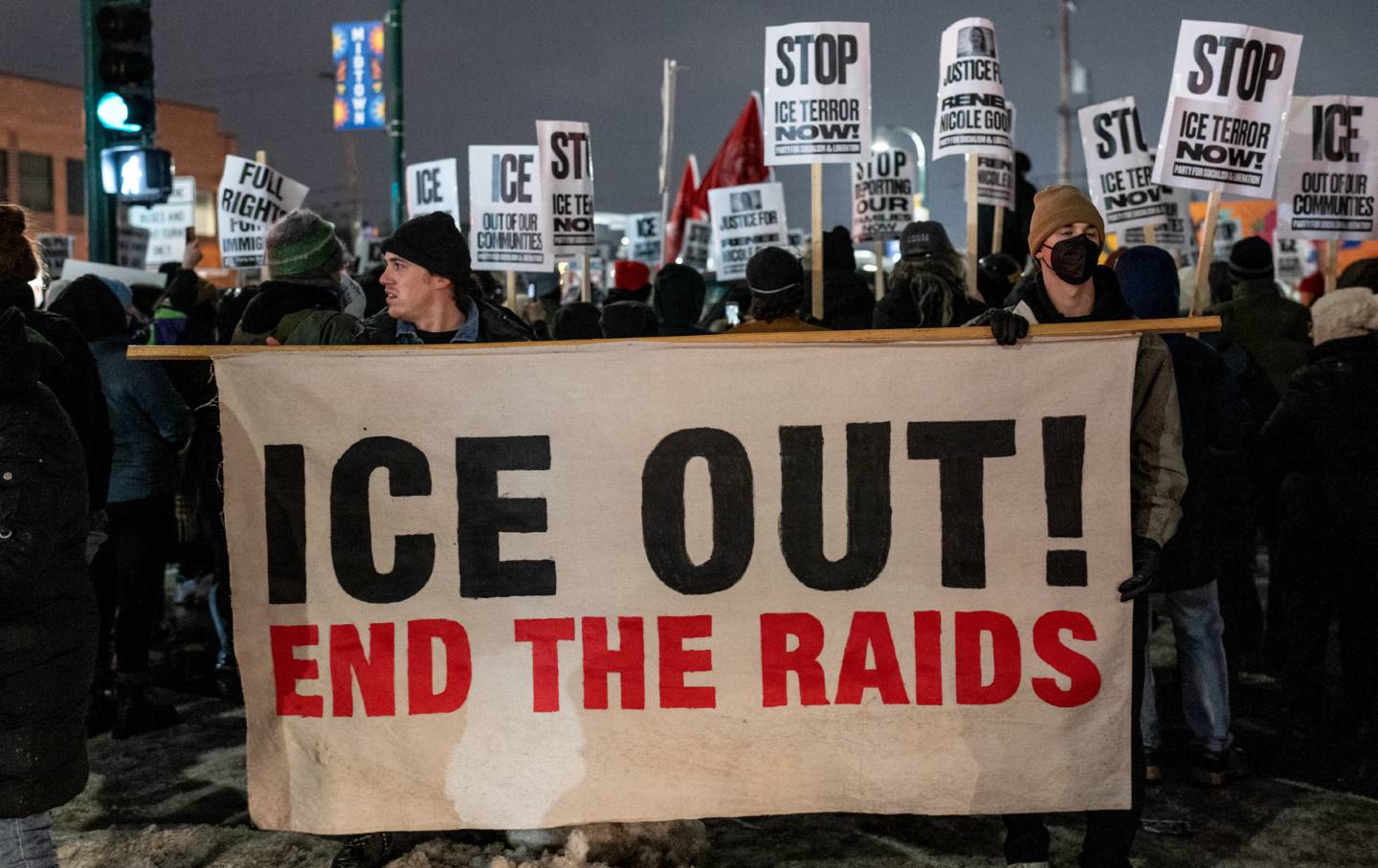
Abolish ICE or GTFO Abolish ICE or GTFO
In this week’s Elie v. US, The Nation’s justice correspondent makes the case to get rid of ICE, explores George Conway’s congressional campaign—and shares his New Year’s resolutio...
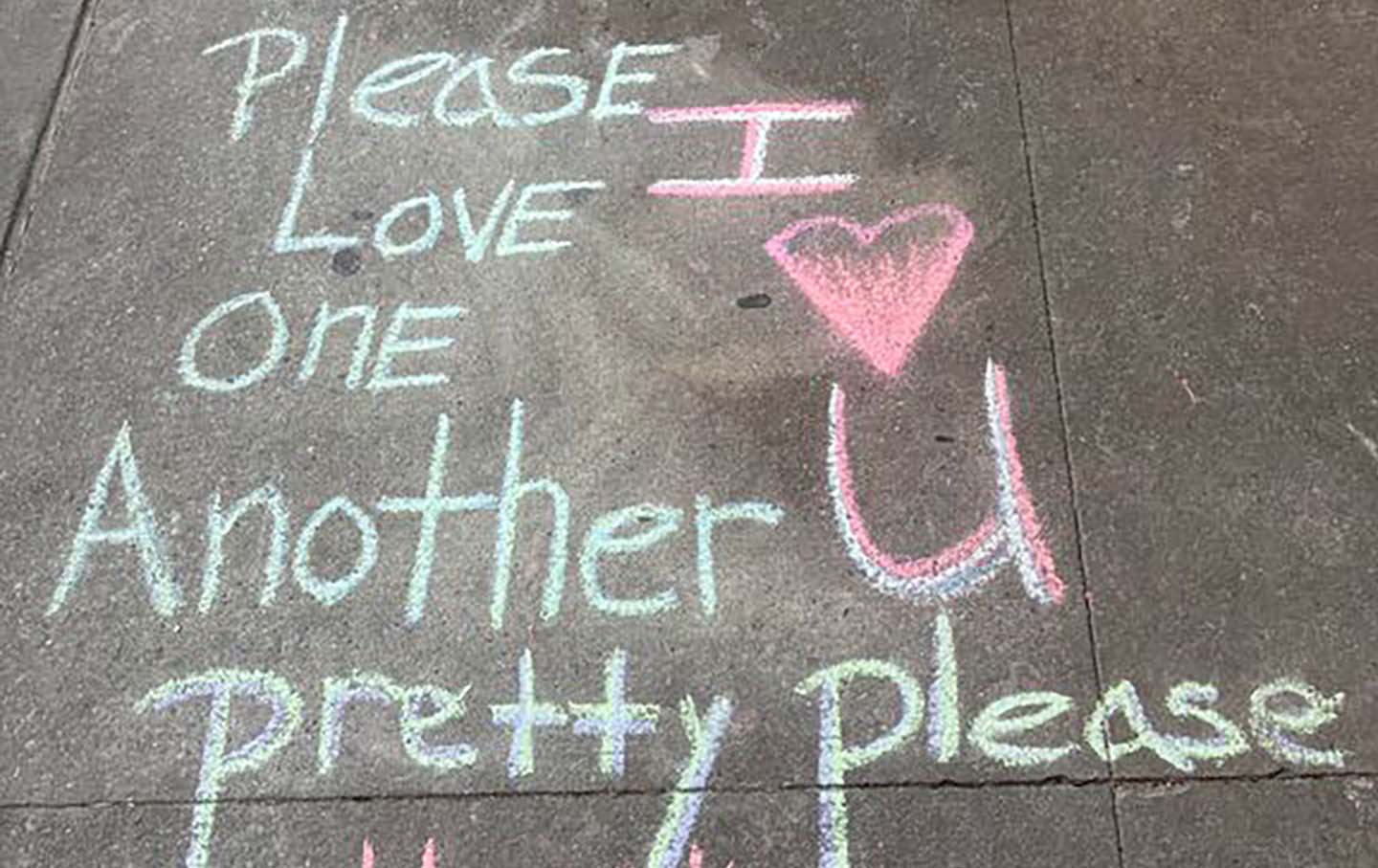
Pretty Please Pretty Please
Graffiti near Union Square, New York City.
OppArt / Anonymous and Peter Kuper
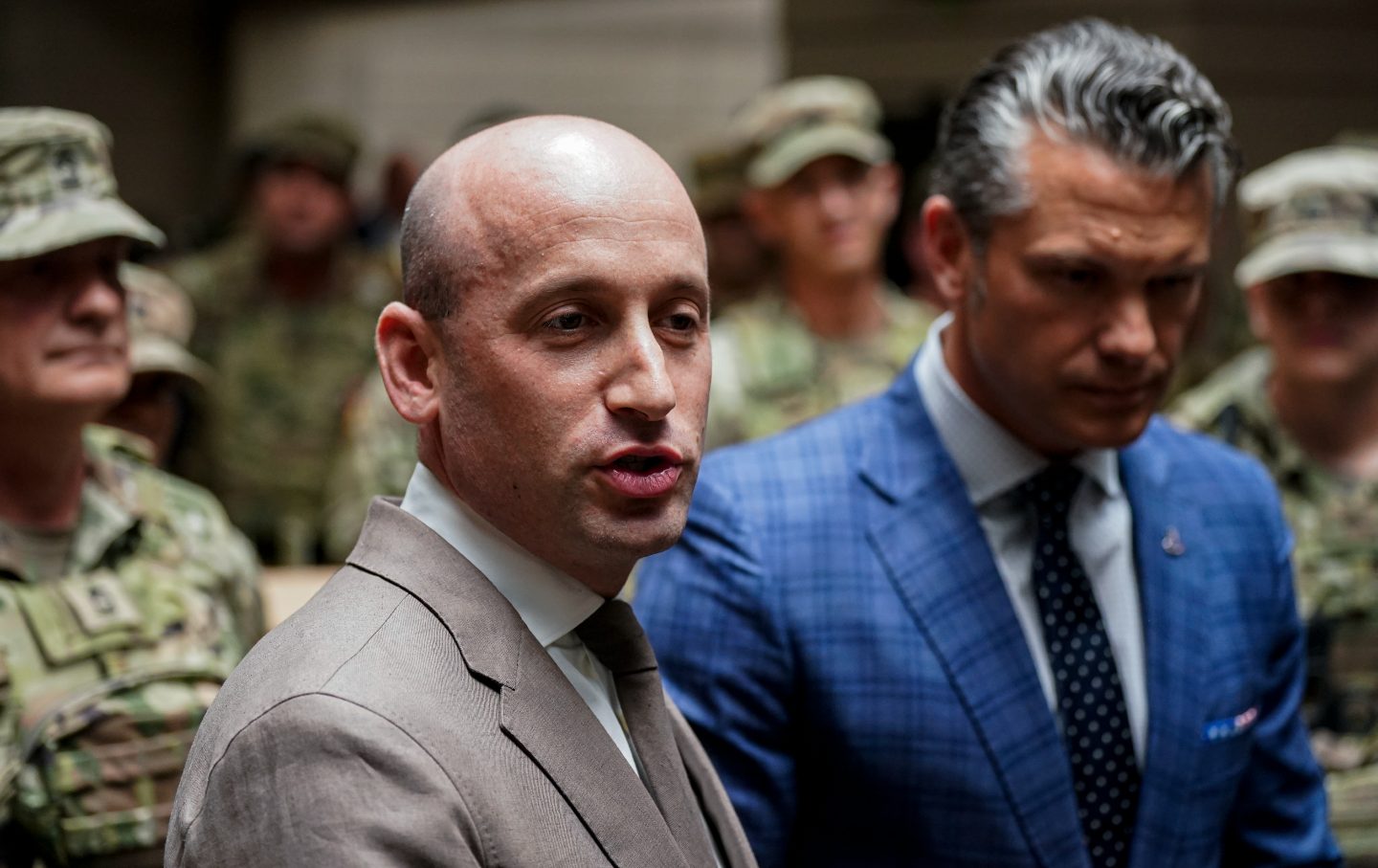
The Ugly Beast of American Authoritarianism The Ugly Beast of American Authoritarianism
Might is right is the philosophy behind the Trump administration’s decision to kidnap Nicolás Maduro.
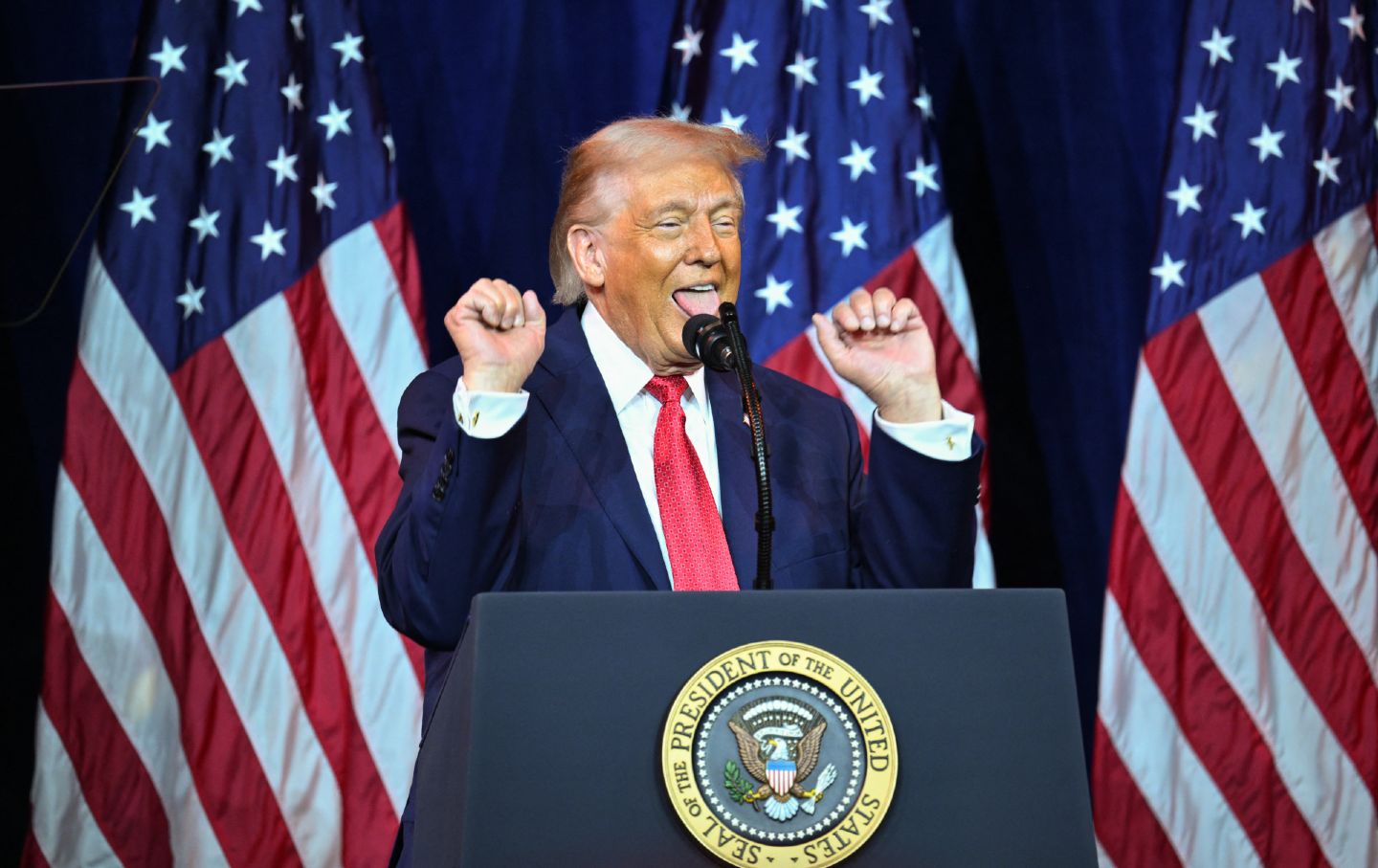
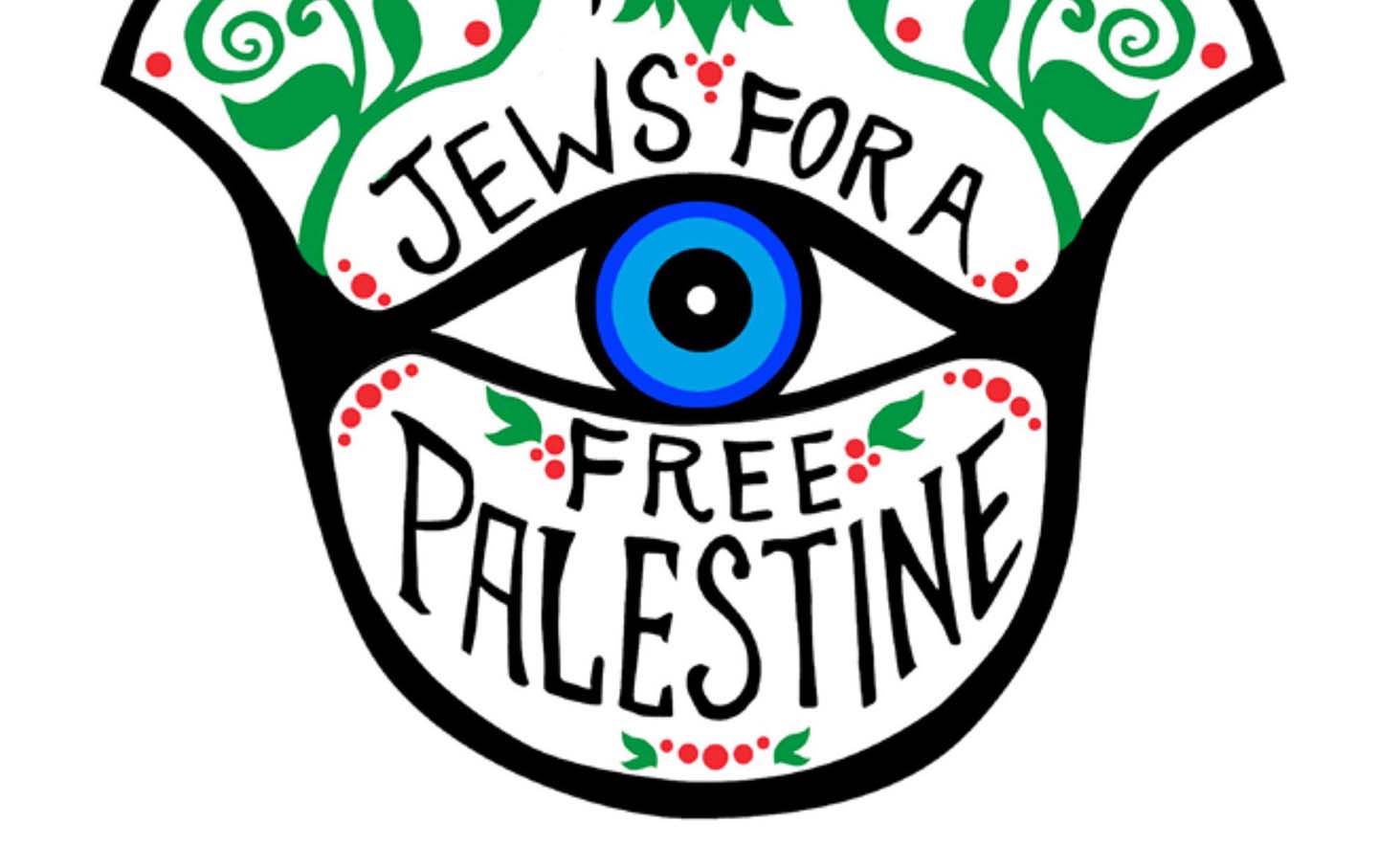
Jews for a Free Palestine Jews for a Free Palestine
Being anti-genocide isn’t antisemitic.

